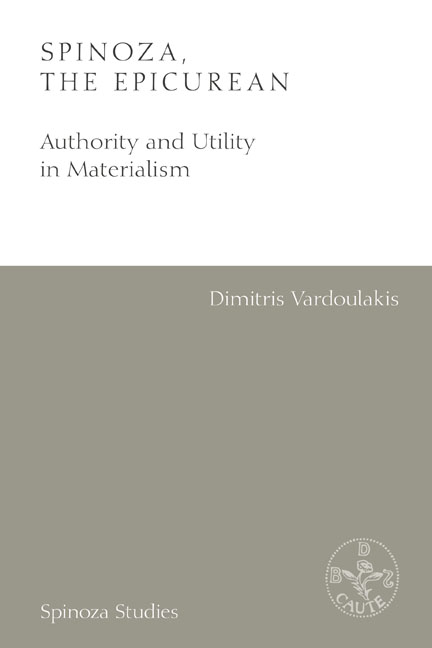Book contents
- Frontmatter
- Contents
- Reference Guide to Spinoza’s Work
- Acknowledgements
- Dedication
- Preamble
- Introduction: Why is Spinoza an Epicurean?
- 1 Freedom as Overcoming the Fear of Death: The Dialectic of Authority and Utility in the Preface
- 2 The Power of Error: Moses, the Prophets and the People (chapters 1, 2 and 3)
- 3 Philonomianism: Law and the Origin of Finitude (chapter 4)
- 4 Political Monism: The Primacy of Utility over Authority (chapters 5 and 6)
- 5 Love your Friend as Yourself: The Neighbour and the Politics of Biblical Hermeneutics (chapters 7 to 13)
- 6 The Freedom to Philosophize: The Two Paths to Virtue (chapters 14 and 15)
- 7 Fear and Power: Natural Right and Authorization in Spinoza and Hobbes (chapter 16)
- 8 Theocracy: On the State of Authority (chapters 17 and 18)
- 9 The Authority to Abrogate: The Two Paths to Virtue and the Internal Enemy (chapters 19 and 20)
- Conclusion: The Limitation of Spinoza’s Epicureanism
- Bibliography
- Index
2 - The Power of Error: Moses, the Prophets and the People (chapters 1, 2 and 3)
Published online by Cambridge University Press: 20 October 2020
- Frontmatter
- Contents
- Reference Guide to Spinoza’s Work
- Acknowledgements
- Dedication
- Preamble
- Introduction: Why is Spinoza an Epicurean?
- 1 Freedom as Overcoming the Fear of Death: The Dialectic of Authority and Utility in the Preface
- 2 The Power of Error: Moses, the Prophets and the People (chapters 1, 2 and 3)
- 3 Philonomianism: Law and the Origin of Finitude (chapter 4)
- 4 Political Monism: The Primacy of Utility over Authority (chapters 5 and 6)
- 5 Love your Friend as Yourself: The Neighbour and the Politics of Biblical Hermeneutics (chapters 7 to 13)
- 6 The Freedom to Philosophize: The Two Paths to Virtue (chapters 14 and 15)
- 7 Fear and Power: Natural Right and Authorization in Spinoza and Hobbes (chapter 16)
- 8 Theocracy: On the State of Authority (chapters 17 and 18)
- 9 The Authority to Abrogate: The Two Paths to Virtue and the Internal Enemy (chapters 19 and 20)
- Conclusion: The Limitation of Spinoza’s Epicureanism
- Bibliography
- Index
Summary
I have been arguing thus far that the Theological Political Treatise is organized according to the dialectic of authority and utility. A problem emerges when we consider that a practical judgement about utility arises as a response to given circumstances, and if the circumstances are so manifold and unpredictable that they cannot be organized under steadfast rules, then practical judgement or phronesis can never aspire to either certainty or truth. It is, as Hannah Arendt puts it, a judging ‘without banisters’. Any particular calculation of utility – be it at a personal or communal level – can never know for sure that its inferences are correct, since it needs to extract the criteria for judging from the unpredictable and uncodifiable situation it assesses.
Spinoza turns this feature of the calculation of utility into a mechanism that allows him to trace the operation of the dialectic of authority and utility. This is possible because the dialectic is not concerned with the truth or falsity of judgements that pertain to action. Instead, it concerns the effects of action. And such effects are registered when mistakes are made just as much – if not more – than when the correct decisions are taken. The first two chapters of the Theological Political Treatise suggest that the effects of these mistakes can be productive – and what they produce is authority. Subsequently, these mistakes are carried out in the definition of the people as described in the third chapter of the Treatise.
To discern these productive mistakes, we need to recall Lucretius's distinction between potestas – the kind of power that is artificial and that is instituted, as well as the kind of power that authority enjoys – from potentia – the ontological or ‘natural’ power that indicates the potentiality or capability of entities. All three mistakes – about the production of authority in the first two chapters and the production of the people in the third chapter – consist in misunderstandings about potentia, and thereby affect the interplay of potentia and potestas, which produces significant effects for the dialectic of authority and utility.
Schematically, the errors are as follows: The first error is made by the people. They mistake revelation as a kind of special knowledge that is superior to the natural knowledge shared by all. Thus they erroneously attribute a superior potentia to the prophets, which creates their authority.
- Type
- Chapter
- Information
- Spinoza, the EpicureanAuthority and Utility in Materialism, pp. 76 - 108Publisher: Edinburgh University PressPrint publication year: 2020



